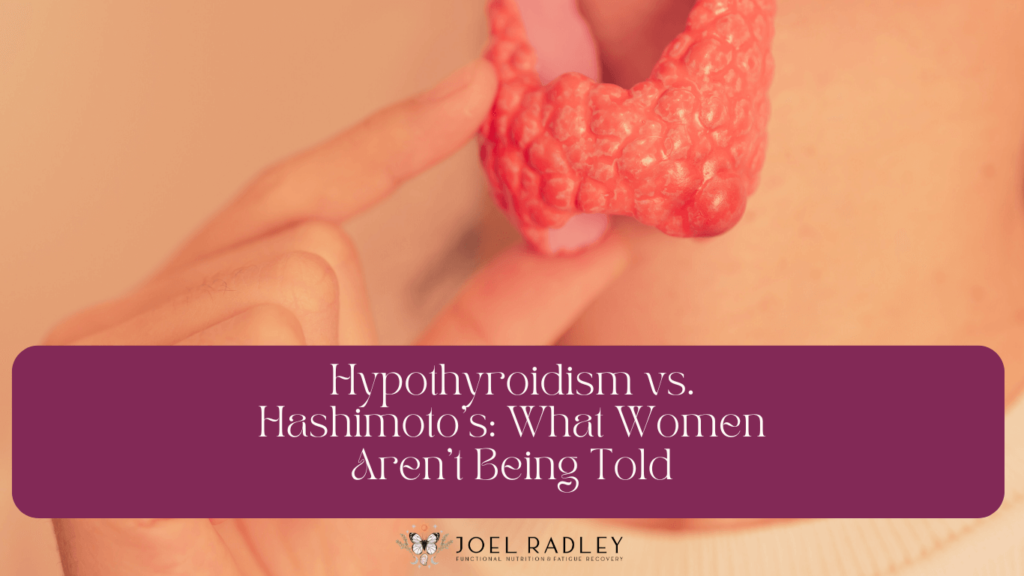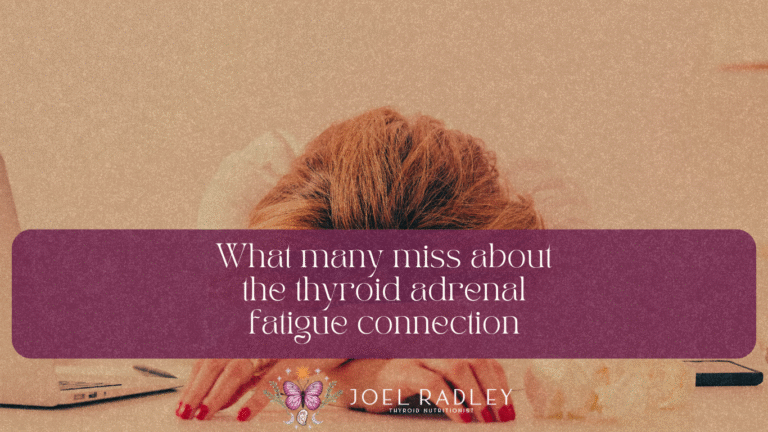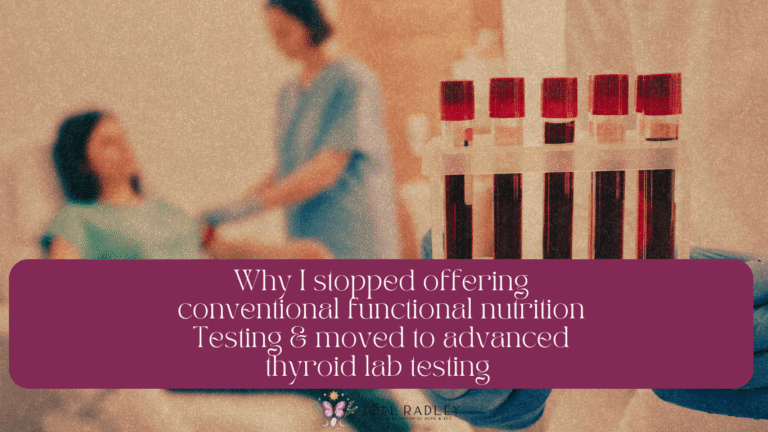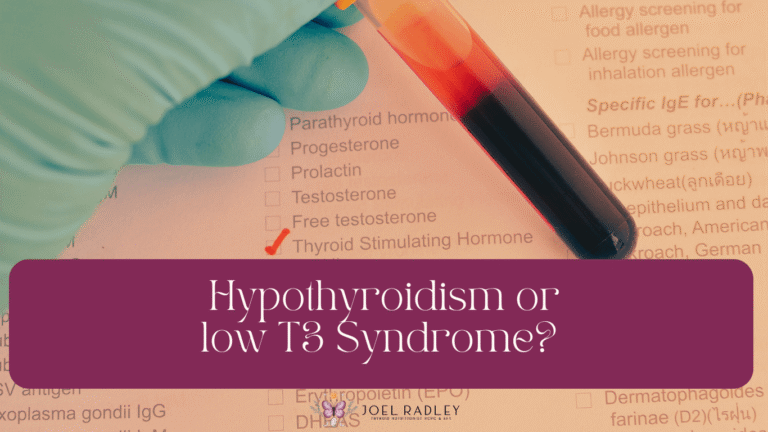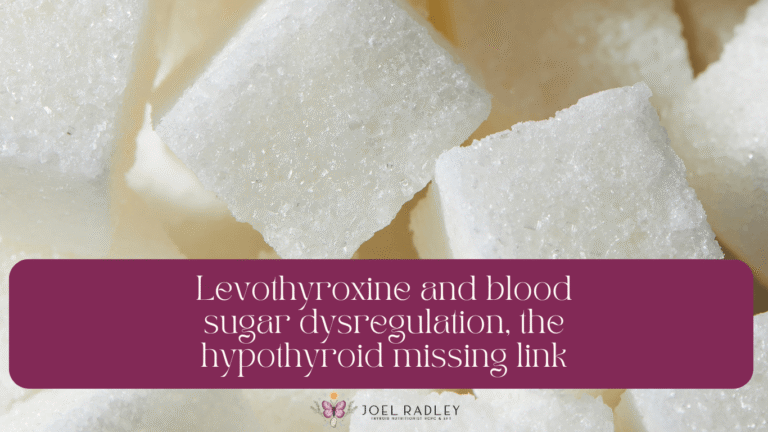Table of Contents
Magnesium and Thyroid Health
Most female clients I work with are told: “Your thyroid is sluggish, here’s a pill, get on with it.”
And right now? Women are being misdiagnosed, under-tested, and over-medicated.
But here’s the dirty little secret: hypothyroidism and Hashimoto’s aren’t the same thing. The distinction matters, because treatment, and your long-term health, depends on it.
Let’s break it down.
What is Hypothyroidism
Hypothyroidism means your thyroid gland isn’t making enough hormone.
- It could be from nutrient deficiencies (iron, selenium, magnesium, iodine imbalances).
- It could be stress, poor conversion of T4 into T3 in the liver.
- It could be sluggish metabolism after years of dieting, birth control, or adrenal burnout.
Symptoms include:
- Crushing fatigue
- Brain fog
- Weight gain
- Cold hands and feet
- Depression and anxiety
- Hair loss and brittle nails
Broda Barnes—an endocrinologist who worked with thousands of women, said it best: low thyroid is low metabolism. He tested temps and pulse, not just labs, to find out if women were truly running on empty.
What is Hashimoto’s
Hashimoto’s is labelled as an autoimmune disease, where the immune system is thought to attack the thyroid. Doctors measure antibodies like TPO or TgAb to make this diagnosis.
But here’s the twist: Ray Peat argued antibodies are more like an alarm system. They’re a sign of stress and cellular damage, not proof your body is “self-attacking.”
In German New Medicine, the cell proliferation and then break down is seen more of a supportive process in times of emotional stress, with the clean up being possibly misinterpreted as an attack.
In other words: your thyroid isn’t your enemy. Chronic stress, nutrient imbalance, and inflammation are, as this with hashimoto’s know too well. Either way treatment must be focused on turning the hashimoto’s switch off.
Other Root Causes of Hashimoto’s
Hashimoto’s often shows up at key stages in a woman’s life, like pregnancy, perimenopause, or postpartum. These hormonal shifts can “flip the switch” on thyroid autoimmunity. This is another reason why I am more on the camp that the body is not attacking itself.
But life stages aren’t the only culprits. Hidden triggers often include:
- Mold exposure – constant immune stress and toxicity.
- Gut infections & parasites – low-grade infections that keep the immune system on red alert.
- Gut dysbiosis – imbalance of bacteria that fuels inflammation and leaky gut.
- Chronic stress – high cortisol suppresses thyroid hormone conversion and amps up antibodies.
When the body is under siege, whether from hormones, toxins, or infections, the thyroid often becomes collateral damage.
Hypothyroidism vs Hashimoto’s – The Key Difference
Hypothyroidism = underactive thyroid, low hormone output, poor conversion to T3.
Hashimoto’s = immune system alarm bells going off, signalling deeper stress and tissue damage.
The big problem?
Doctors often don’t test thoroughly enough to tell the difference.
Hypothyroidism vs Hashimoto’s: Quick Comparison Table
| Hypothyroidism | Hashimoto’s | |
|---|---|---|
| Cause | Low thyroid output / poor conversion | Immune alarm signals, stress, inflammation |
| Main Tests | TSH, Free T4, Free T3, Reverse T3 | TPO antibodies, TgAb, plus full thyroid panel |
| Symptoms | Fatigue, weight gain, brain fog | Same as hypo + flares, inflammation signs |
| Standard Care | T4 only (Levothyroxine) | Watch-and-wait until thyroid burns out |
| Root Approach | Support metabolism, liver, nutrients | Reduce stress, balance minerals, calm immune system |
FAQs – Hypothyroidism vs Hashimoto’s
1. Can you have Hashimoto’s without hypothyroidism?
Yes. Antibodies can be high long before thyroid hormone output drops. This is why waiting until your thyroid is “burnt out” is a failed strategy.
2. Why does T4 medication not fix my symptoms?
Because your body often struggles to convert T4 into T3, the active form. Without addressing stress, nutrient status, and liver function, T4 alone leaves many women symptomatic.
3. How do I know if I should be tested for Hashimoto’s?
If you’ve got classic hypothyroid symptoms plus unexplained inflammation, flares, or your TSH keeps swinging, you need antibody testing alongside a full thyroid panel.
How Women Are Being Failed by Standard Testing
Most women get:
- TSH only (maybe T4 if you’re lucky).
That’s like diagnosing a car problem by looking at the fuel gauge while ignoring the engine.
Here’s what often gets missed:
- Free T3 (the active hormone your cells need)
- Reverse T3 (shows blocked metabolism)
- Thyroid antibodies (TPO, TgAb)
- Cerruloplasmin, Transferin, Retinol, Copper, Magnesium, Zinc
- Cortisol patterns and liver function
Without these, women are put on Levothyroxine (synthetic T4) and sent away, still tired, still anxious, still cold.
Why women are taken advantage of?
The current system creates lifelong “thyroid patients”:
- Incomplete testing → vague diagnosis.
- A pill for life → often the wrong pill.
- No root-cause support → you stay tired, foggy, anxious.
This isn’t treatment, it’s management. And management keeps you dependent.
Women deserve full thyroid panels, root-cause investigation, and metabolic support, not just bandaids.
Why T4 Therapy Sometimes Works, and Sometimes Doesn’t
Many of my clients come to me after following generic thyroid or Root Cause Protocol advice. They tried If you’ve got plain hypothyroidism, your thyroid just isn’t making enough T4, then yes, T4 therapy (like Levothyroxine) can give you some relief. You’re replacing what’s missing.
But here’s the kicker:
- If the problem is conversion (T4 not turning into T3)
- Or stress hormones jamming the gears
- Or inflammation, infections, and poor diet clogging the system
- Or if you’ve got Hashimoto’s, where the thyroid is under immune attack
…then T4 on its own will do almost nothing. In fact, many women on Levothyroxine stay symptomatic for years because no one bothered to check why their thyroid was low in the first place.
This is why a whole-body, metabolic approach, supporting liver, minerals, and immune balance, is non-negotiable.
Final comments
- Hypothyroidism is about energy.
- Hashimoto’s is about stress.
- Standard treatment ignores both.
Until women are fully tested and treated with a whole-body, metabolic approach, they’ll keep being under-diagnosed, over-medicated, and underserved.
Your thyroid isn’t just a gland, it’s the ignition switch for your entire life.
Optimal Treatment
In my 1:1 Coaching programs we focus on the concepts below:
If your temps and pulse are low, you’re hypothyroid, no matter what your TSH says. He often treated with natural desiccated thyroid and nutrition, restoring metabolism instead of chasing lab numbers. You can test yours with my free test here.
Focus on energy production. Reduce stress hormones, improve liver function, balance minerals, and support conversion to T3. He emphasized lowering inflammation and seeing antibodies as signals, not self destructions.
If you suffer from hypothyroidism, Hashimoto’s, and had enough of DIYing different protocols, supplements and diets? Instead, work with a practitioner who can test your mineral status, support your adrenals, and personalize your approach.
Your thyroid deserves more than cookie-cutter solutions.
If you’re ready to get out of the fog of medications with lousy results, unbearable side effects like thinning hair, low energy and weight issues, into a functional healing plan that actually works,
reach out and let’s find what your body’s been missing. Reach out via messaging me, and I’ll send you my free “Test Your Thyroid at Home” guide and share how we can work together 1:1 to restore your thyroid, gut, and energy, for good.
Warmly,
Joel



